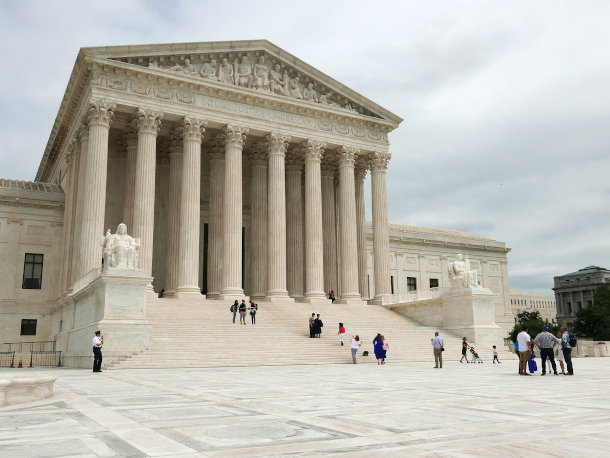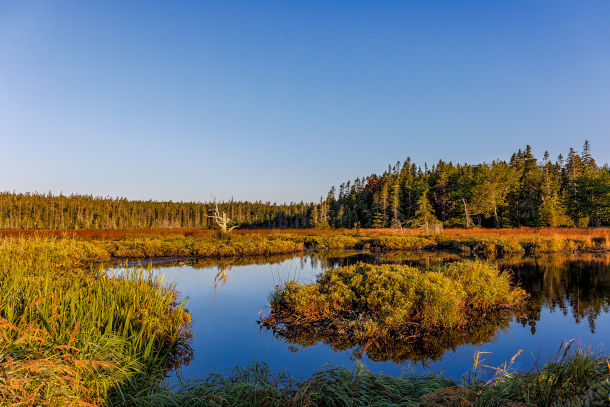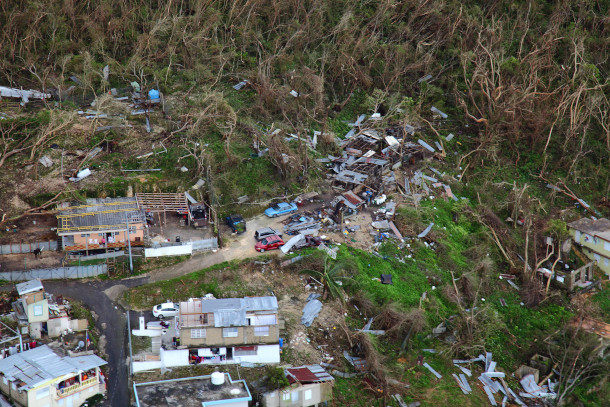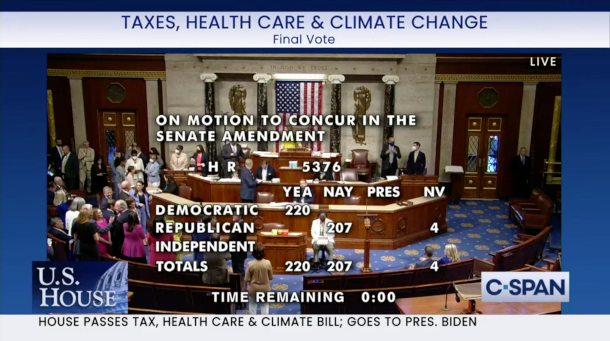Environment and the Law in 2023
Air Date: Week of January 6, 2023

The court's decision in West Virginia v. EPA found that the agency effectively does not have the power to regulate the mix of generation sources to address carbon dioxide emissions from power plants. (Photo: Susan Melkisethian, Flickr, CC BY-NC-ND 2.0)
The case West Virginia v. EPA and the Inflation Reduction Act made 2022 a landmark year for environmental law. Pat Parenteau, former EPA regional counsel and emeritus professor at Vermont Law School, joins Host Steve Curwood to look ahead to environmental legal actions on the horizon in 2023, including Supreme Court clean water and other decisions, environmental justice implementation, and suits alleging climate racketeering.
Transcript
DOERING: From PRX and the Jennifer and Ted Stanley studios at the University of Massachusetts, Boston this is Living on Earth. I’m Jenni Doering.
And I’m Steve Curwood.
2022 was a landmark year for environmental law, both in terms of court decisions and legislation, and now as 2023 gets underway there are even more legal actions and decisions on the horizon. These include protections for our climate, clean water and wildlife and moving the federal government from words to action. And to help us sort it out we turn now to Pat Parenteau, former EPA regional counsel and emeritus professor at Vermont Law School. Welcome back to Living on Earth, Pat!
PARENTEAU: Thanks, Steve. Good to be with you in 2023.
CURWOOD: Yeah, Happy New Year. Let's go over some of the standout court cases first from last year. What was decided in 2022 that, well, we'll be thinking about some more in 2023?
PARENTEAU: Well, the big one, of course, was West Virginia v EPA, which was the Supreme Court striking down the Obama Clean Power Plan regulating greenhouse gas emissions from steam electric power plants. And the way in which the Court did it is the most troubling thing about the decision. We were not surprised, those of us watching this case, that EPA was going to lose. But the court invoked this new doctrine called a major question doctrine, which basically interferes with the way Congress delegates authority to agencies like EPA, to deal with emerging environmental problems, even crises like the climate crisis. And the court has really now adopted a rule of interpreting the scope of agency authority that's going to make it harder for agencies like EPA, like the Fish and Wildlife Service, to interpret their statutory authorities in ways that address these emerging environmental problems. So that case stands out as the most dramatic court decision from last term.

Over the last three presidential terms, the precise scope of WOTUS (Waters of the United States), protected under the Clean Water Act of 1972, has been fiercely debated. (Photo: Tim Lumley, Flickr, CC BY-NC-ND 2.0)
CURWOOD: Now, looking ahead to 2023, what upcoming decisions are you keeping an eye on?
PARENTEAU: We have these climate liability lawsuits against the fossil fuel industry, all of those are at an early stage. And they're all questions of where should these cases be heard: in state court, or federal court? Oil companies would prefer to be in federal court, where they think they're going to get a better outcome. But all of those cases, and there were like five different courts of appeals decisions, have sent those cases, back to the state courts to be heard. And now we're waiting to see whether the Supreme Court will accept review, in at least three of these climate liability cases, led by the City and County of Boulder, Colorado, but also the city of Baltimore. And of course, there was the argument in the big Clean Water Act case, Sackett v EPA. And that case was argued last fall, it was the very first case on the docket for the Supreme Court. And so now we're waiting for a decision from the Supreme Court on the scope of the Clean Water Act. And in the meantime, of course, the Biden administration has just now adopted a new rule, interpreting the scope of the Clean Water Act. But that's very much in doubt, until we see the Supreme Court decision. So those are some of the biggies carrying over into the new year.
CURWOOD: And one of these cases involves climate racketeering, Pat?

Puerto Rican communities, devastated by Hurricane Maria in 2017, have brought a lawsuit against fossil fuel companies under the Racketeer Influenced Corrupt Organizations (RICO) act. (Photo: Kris Grogan, U.S. Customs and Border Protection, Wikimedia Commons, public domain)
PARENTEAU: Yeah. So in this case, Puerto Rico sued not just the oil companies, but the coal companies, and plastics manufacturers under what we call RICO, the racketeering and investigation federal law, which was passed by Congress to deal with organized crime. But it's a very, very broad statute, and it has been used to address conspiracies, where companies, in this case we're talking fossil fuel companies, get together and plot to deceive the public, to deceive their customers, and also to block efforts by Congress, among others, to adopt regulations on their business activities. In the case of the oil companies, it's their carbon emissions, and so forth. So it's the first time that this law has been brought to bear on the climate issue. And there's a long way to go in this case. You know, you have to show that the companies not only worked in concert, but also used mail. And of course, internet and social media and other mechanisms. That's one of the triggers for invoking RICO. And you know, the damages that can be obtained are very significant. They include giving up profits, ill gotten gains, if you will, if you can prove this conspiracy to deceive the public. So this is definitely a lawsuit to watch. And one of the reasons I say that is because the law firm that's representing Puerto Rico has a very impressive track record of bringing cases against these major corporations under RICO and also invoking other doctrines of law to seek damages from these corporations. So you've got a battle of giants, you've got a really big powerful law firm up against, of course, the powerful law firms representing the fossil fuel industry. So the Puerto Rico case is a big one.
CURWOOD: So, the National Environmental Policy Act and the Endangered Species Act took a lot of hits during the Trump administration, the scaling back on how those laws should be enforced. What if anything, do you think is likely to happen with these in the upcoming year?
PARENTEAU: Well, that's very true. There's a list of rules that were adopted under the Trump administration, Endangered Species Act, National Environmental Policy Act, Clean Water Act, and so forth. And the truth is that the Biden administration has been working to undo the rules that were adopted, but have not accomplished what's necessary. We do not have a replacement rule for the Endangered Species Act Rule the Trump administration adopted, or the NEPA rule, completely, that the Trump administration adopted. We don't have a rule now for regulating greenhouse gases from power plants as a result of the Supreme Court's West Virginia decision. We don't have any regulation of power plant emissions. So we're falling further behind on all fronts, frankly. There's certainly some good news, we haven't talked about the good news that did happen, the Inflation Reduction Act, the climate bill, for example, but frankly, in terms of everyday environmental law, we're losing ground in the United States. And we're not tackling the environmental justice component that the Biden administration is committed to doing. But you know, it's boots on the ground, when you're talking about environmental justice, it's actually getting into the communities that are suffering disproportionate impacts, with monitoring, with enforcement, with substitute sources of energy, substitute sources of manufacturing, and so on. You know, these are problems that require a much greater commitment from the federal government, not less. It certainly requires the states to step up, in many ways, and a lot of states are, in fact, stepping up. But overall, you know, going into this new year, the list of environmental problems that are staring us in the face is formidable. And if we're going to do it with incentives, instead of using regulation, then we're just talking about huge amounts of money, money measured in the billions and trillions, not just millions. So those are the kinds of things that we're looking at, going forward.

The U.S. House of Representatives passed the Inflation Reduction Act of 2022 on August 12. All Democratic representatives voted yes to pass, while no Republican representatives did. (Screenshot: C-SPAN)
CURWOOD: I think it's safe to say that one of the most notable pieces of legislation passed in 2022 is the inflation Reduction Act, which in some allots close to $370 billion over the next 10 years to address the climate crisis. Many provisions that climate activists are really excited about. What should we be looking out for in 2023 when it comes to the inflation Reduction Act, do you think?
PARENTEAU: Yeah, that's a historic Act. And it does give us a shot at reducing the emissions across the economy by something like 40% by 2030. And that would be huge. So what has to happen of course now, is you've got to turn all of those words of the statute into rules and actions and investments very fast. And the first rule that rolled out actually came from the Treasury Department. The Treasury Department had to issue a rule on how the money to individual consumers for things like electric vehicles, both new and used, heat pumps, solar panels, and a variety of green energy technologies. How do you get those down to the level of individual households? And of course, how do you build larger systems, commercial scale systems as well? And here's how tricky this all becomes.

Pat Parenteau is emeritus professor of law at Vermont Law School and formerly served as EPA Regional Counsel. (Photo: Courtesy of Vermont Law School)
As a condition of getting the Inflation Reduction Act passed, and getting Senator Manchin's support, the Act requires a Made in America provision. So in order for you to qualify for the $7,500 tax credit for an electric vehicle, it has to be demonstrated that the material that goes into the battery, the electric battery, the lithium ion battery, is either sourced in the United States, and we don't have much lithium mining right now, or sourced in countries with whom we have trade agreements, which doesn't include China or Russia. Those are the two major sources of lithium right now. So I'm giving an example of how fiendishly complicated these laws are and how you actually get them implemented. But the Treasury Department found a loophole and said, if you lease an electric vehicle, then the Made in America provision doesn't apply. So all of a sudden, the $7,500 credit can be available to people who at least are willing to lease a vehicle. So that's one tiny little example. And you're right, it's $370 billion dollars worth of money, which is real money when it comes to a clean energy investment. And it is very good news for the new year.
CURWOOD: Pat Parenteau is an emeritus professor of law at the Vermont Law School. Pat, thanks so much for your time today.
PARENTEAU: Pleasure, Steve. Always.
Links
Supreme Court of the United States | “Sackett vs. EPA Oral Argument Transcript: 10/03/2022”
Living on Earth wants to hear from you!
Living on Earth
62 Calef Highway, Suite 212
Lee, NH 03861
Telephone: 617-287-4121
E-mail: comments@loe.org
Newsletter [Click here]
Donate to Living on Earth!
Living on Earth is an independent media program and relies entirely on contributions from listeners and institutions supporting public service. Please donate now to preserve an independent environmental voice.
NewsletterLiving on Earth offers a weekly delivery of the show's rundown to your mailbox. Sign up for our newsletter today!
 Sailors For The Sea: Be the change you want to sea.
Sailors For The Sea: Be the change you want to sea.
 The Grantham Foundation for the Protection of the Environment: Committed to protecting and improving the health of the global environment.
The Grantham Foundation for the Protection of the Environment: Committed to protecting and improving the health of the global environment.
 Contribute to Living on Earth and receive, as our gift to you, an archival print of one of Mark Seth Lender's extraordinary wildlife photographs. Follow the link to see Mark's current collection of photographs.
Contribute to Living on Earth and receive, as our gift to you, an archival print of one of Mark Seth Lender's extraordinary wildlife photographs. Follow the link to see Mark's current collection of photographs.
 Buy a signed copy of Mark Seth Lender's book Smeagull the Seagull & support Living on Earth
Buy a signed copy of Mark Seth Lender's book Smeagull the Seagull & support Living on Earth

